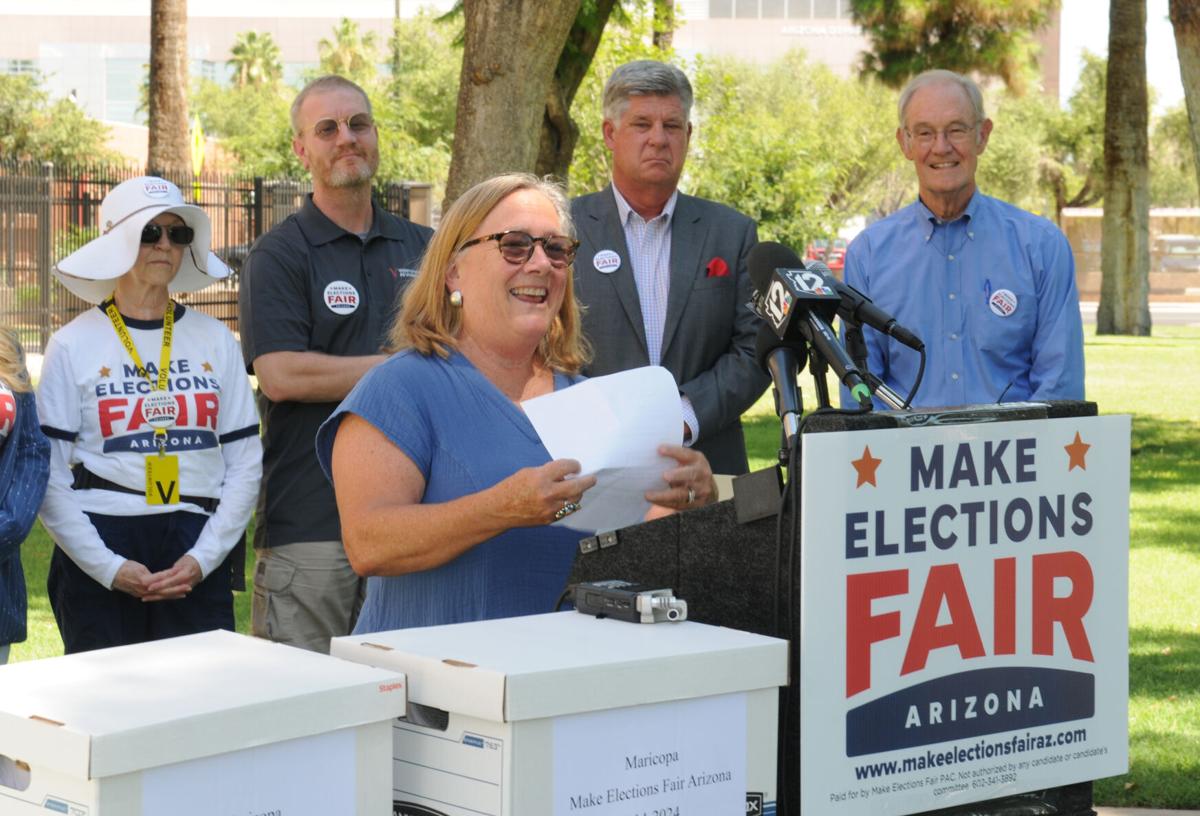PHOENIX — There are more than enough signatures on petitions to let voters decide whether to scrap the system of partisan primary elections, a judge ruled Thursday.
But that still doesn’t mean Proposition 140 will be on the ballot, as an appeal has been filed.
Foes of the Make Elections Fair initiative had charged that a number of people who circulated the petitions had not registered as required with the Secretary of State’s Office. They argued that invalidated the signatures on those sheets.
They also said there were other duplicate and questionable signatures.
But Maricopa County Superior Court Judge Frank Moskowitz said even eliminating those petitions, there still were 536,216 valid signatures, more than the 383,923 needed to qualify for the ballot.
Moskowitz had previously dismissed claims by the Free Enterprise Club and some Democratic voters that the initiative itself was legally flawed because it asks voters to approve too many changes in a single ballot measure.
“The initiative’s provisions are sufficiently related to a common purpose or principle,’’ the judge ruled, satisfying the constitutional requirements. “That common purpose or principle and general topic is reforming candidate elections.’’
This is the third legal win for supporters of revamping the electoral process.
Earlier this week Maricopa County Superior Court Judge Melissa Julian ruled that state lawmakers acted improperly in how they wrote an explanation for voters of what Prop. 140 would do.
That, however, is not the last word, as House Speaker Ben Toma, who heads the Legislative Council that approved the wording, vowed to take the issue to the Arizona Supreme Court.
That, apparently, is also the fate awaiting the latest decision by Moskowitz. A notice of appeal already was filed.
The high court is expected to issue a final ruling this coming week.
At issue is whether voters get to decide whether to replace the current system where each party selects its candidates in a primary — one open only to party adherents and independents — in favor of what’s been called a “jungle primary.’’ That pits all candidates from all parties and those who are unaffiliated against each other, with all registered voters entitled to vote for whoever they want.
The proposal would leave it to the Legislature to decide how many candidates advance to the general election. It could be as few as the top two.
But lawmakers could allow up to five on the ballot for each office. And in that case voters would make their choices on a ranked basis of top to bottom, with multiple stages of counting and eliminating contenders until only one was left who got at least 50% of the vote.
Partisans from both major parties have panned the effort as it could result in none of their picks making the general election ballot.
Moskowitz said he found no fault in putting both the issues of the primary and general elections into a single ballot measure.
“While primary and general elections may serve different functions, that does not render them topically unrelated for purpose of an initiative whose common purpose or principle and general topic is reforming candidate elections,’’ he wrote.
That left the only option for foes to contest the validity of petitions and sufficiency of signatures, the issue Moskowitz decided Thursday. Those foes were spending big to make their case.
According to the judge, they hired Signafide, which is co-owned by attorney Kory Langhofer. That firm, the ruling says, had 1,200 workers spend 62,000 work hours at a cost of $1 million.
But Moskowitz said the testimony Langhofer presented was not enough to convince him there were problems.
Consider the argument that there were duplicate signatures on petitions.
“Despite the court’s inquiry, Mr. Langhofer could not say how many signatures out of the roughly 43,000 challenged did not involve a subjective and/or discretionary component as to whether the signatures were duplicates, i.e., signed by the same person,’’ the judge wrote.
Moskowitz said the legal burden is on the challengers — and not on the Make Elections Fair committee — to prove their claim of duplicates.
As the case gets appealed, Make Elections Fair has picked up some potentially influential political allies, not only in support of Prop. 140, but also in their arguments asking the courts to send it to the ballot.
Former Gov. Fife Symington and former House Speaker Rusty Bowers, both Republicans, filed an amicus brief with the court saying that, from their own experience, there is ample precedent to allow Prop. 140 to go on the ballot as is.
Attorney Joseph Kanefield, writing for both, pointed out there were multiple election reform bills signed by the former governor.
For example, he said, one signed by Symington including everything from amendments related to voter qualifications, nonpartisan elections, write-in candidates to signature requirements, polling places and ballot contents. Ditto, Kanefield said, of legislation enacted during Bowers’ tenure as speaker.
“In other words, it has been lawmakers’ historic practice to address complicated election issues together in order to achieve sophisticated goals, such as election integrity, candidate accountability, or voter protections,’’ Kanefield wrote for the pair. And he said these applied to both primary and general elections.
He also pointed out that voters have been asked in the past to adopt multi-pronged constitutional amendments as a single ballot measure. Kanefield cited a 2016 proposition that made major changes in school finance.
“These examples illustrate that measures affecting multiple aspects of an election are normal in Arizona,’’ he wrote. “Indeed, it is common — and often necessary — to resolve these types of complex issues comprehensively.”
Get your morning recap of today's local news and read the full stories here: tucne.ws/morning





